Real estate market is booming across the world as a result of skyrocketing urbanization. And that’s why property owners are looking for property management software.
Well, we shall be discussing all you need to know about property management softwares starting from introduction, types, benefits, to development, cost, and more.
By the end of the blog, you will know all you need about property manager software. Therefore, with this being said, let’s get right into it:
What is Property Management Software?
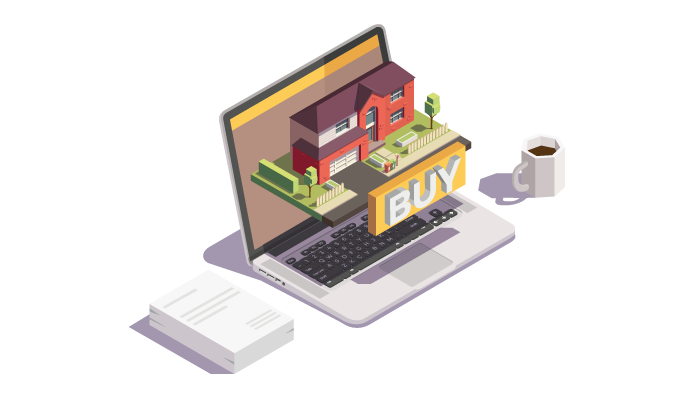
Wondering what is property management software, exactly?
Well, imagine having a powerful tool at your fingertips that simplifies and streamlines the management of your properties.
This tool is called Property Management Software.
And it’s designed to make your life as a property manager more efficient and organized.
At its core, Property Management Software is a digital solution that helps you oversee various aspects of your real estate portfolio.
Whether you’re managing residential apartments, commercial spaces, or vacation rentals, this software acts as your virtual assistant, allowing you to handle tasks with ease.
Now, depending use, there can be different types of property management software. Let’s exploer the same.
Types Of Property Management Softwares
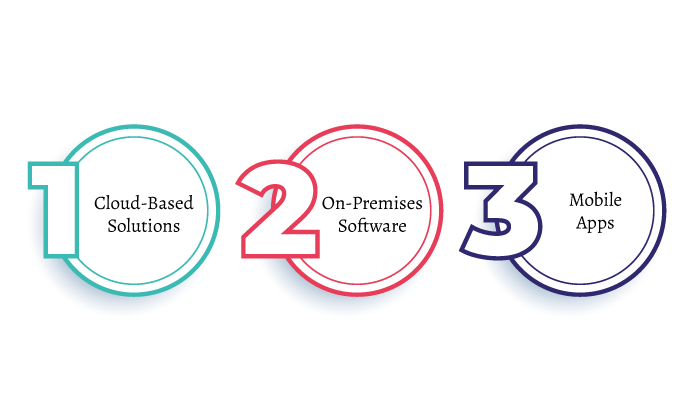
Based on the use, there are ranges of software for property management. In this blog, we shall be discussing all you need to know about these different types.
1. Cloud-Based Solutions
Cloud property management softwares are growing very popular recently.
As a SaaS development solution, Cloud-based software offers flexibility and accessibility, allowing users to manage properties from anywhere with an internet connection.
This type is highly scalable and updates in real time.
2. On-Premises Software
This is one of the more popular property manager software.
On-premises solutions offer more control over data but require local servers. They are suitable for those who prioritize data security and customization.
3. Mobile Apps
Did you know you can automate rental business with rental app development?
Well, property management mobile apps provide the convenience of managing properties on the go.
In addition to this, these apps empower property managers and landlords with instant access to information and tools.
Why Use Property Management Softwares?
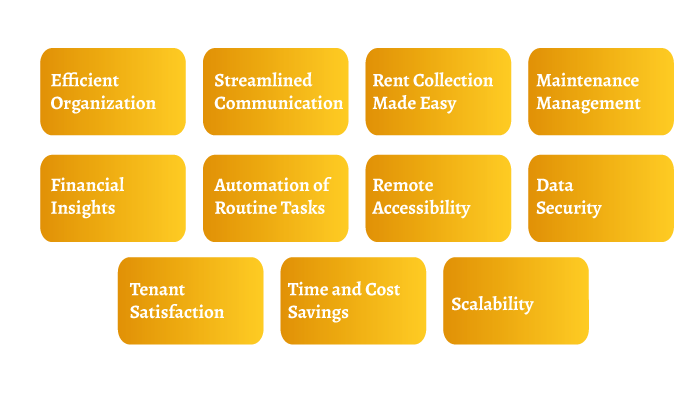
One of the big questions a lot of property managers and property owners ask is, “why should I use property management software?”
Well, there are various reasons to do so.
In this section, we shall be discussing several benefits that come with use of property management softwares.
Therefore, with this being said, let’s get right into it:
Efficient Organization
Property management software centralizes all property-related information, including tenant details, leases, rent payments, and maintenance requests.
Moreover, this organized system eliminates the need for multiple spreadsheets or physical paperwork, saving you time and reducing the risk of errors.
Streamlined Communication
The rental property management softwares provides tools for seamless communication between you, your tenants, and your team.
And send automated rent reminders, maintenance updates, and announcements, fostering better tenant relationships and ensuring everyone stays informed.
Rent Collection Made Easy
With automated rent collection features, you can set up recurring rent payments and receive them online.
This is how commercial property management software, eliminates the hassle of manual rent collection, reduces delays, and improves cash flow management.
Maintenance Management
Again the landlord property management softwares allows tenants to submit maintenance requests online.
Moreover, you can prioritize and assign tasks to maintenance teams, track progress, and provide updates. This results in quicker response times and efficient issue resolution.
Financial Insights
Property management softwares generates detailed financial reports, giving you a clear overview of rent income, expenses, and profits.
This data aids in making informed decisions, budgeting, and preparing for tax obligations.
Automation of Routine Tasks
Another top benefit of software property management is, repetitive tasks like sending reminders, generating reports, and tracking lease agreements can be automated.
This frees up your time to focus on more strategic aspects of property management.
Remote Accessibility
Many property management software solutions offer mobile apps or web-based access, enabling you to manage your properties from anywhere.
This flexibility is particularly useful for busy professionals or those with multiple properties.
Data Security
Reputable software for property managers providers prioritize data security.
Plus, they employ encryption, secure authentication, and regular updates to protect sensitive information, ensuring your tenants’ and your data remains confidential.
Tenant Satisfaction
By providing a streamlined platform for rent payment, maintenance requests, and communication, you enhance the overall tenant experience.
Satisfied tenants are more likely to stay longer, reducing turnover and associated costs.
Time and Cost Savings
Property management softwares significantly reduces manual administrative work, allowing you to operate more efficiently.
This, in turn, translates to cost savings by minimizing human error and optimizing resource allocation.
Scalability
Lastly, scalability.
As your property portfolio grows, managing everything manually becomes challenging.
Property management software scales with your needs, making it easier to manage multiple properties and units.
These are some of the top reasons to use cloud property management software. And with this out of the way, let’s understand the feature of property management software.
Features of Property Management Software
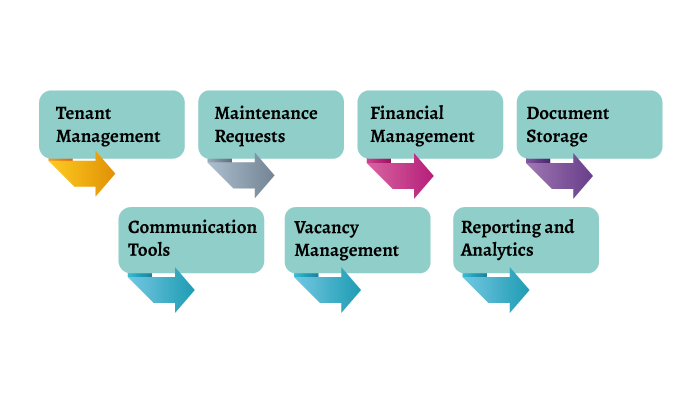
To better understand how property management softwares works, it’s a good idea to learn about the feature of this concept.
Therefore, with this being said, let’s get right into it, starting with:
Tenant Management
This feature enables you to track tenant information, lease agreements, rent payments, and communication history. It enhances tenant satisfaction by addressing their concerns promptly.
Maintenance Requests
Tenants can submit maintenance requests through the software, which property managers can assign, track, and manage efficiently. This feature streamlines property maintenance.
Financial Management
From rent collection to expense tracking and financial reporting, property management softwares simplifies financial tasks and ensures transparency.
Document Storage
Securely store and manage documents such as contracts, agreements, and legal documents within the software for easy access.
Communication Tools
Built-in messaging and notification systems facilitate seamless communication between property managers, tenants, and property owners.
Vacancy Management
List vacant properties, schedule showings, and screen potential tenants effectively to minimize vacancy periods.
Reporting and Analytics
Generate insightful reports and analytics to make data-driven decisions regarding property performance, occupancy rates, and financial trends.
11 Best Property Management Softwares
Market is filled with property manager software.
It is a good idea to go through these amazing examples of best property management software. This gives you a good idea regardless whether you want to create a custom one or use one of these.
More on that later.
As on now, let’s get right into it:
1. OnCite
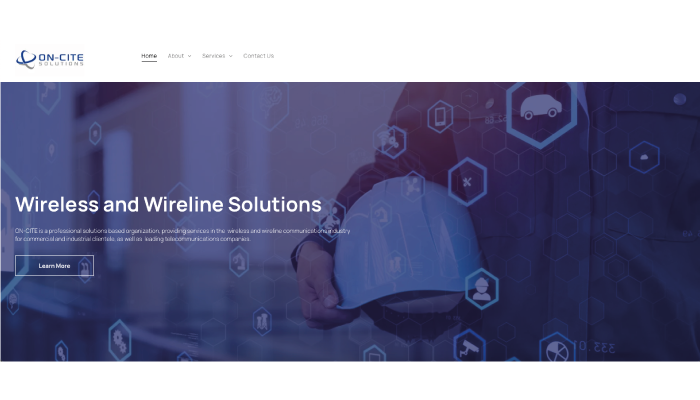
OnCite is a property management software designed to streamline various aspects of property management.
And from rent collection and maintenance tracking to tenant communication and financial reporting.
It offers tools to manage residential and commercial properties, enabling property managers to handle tasks efficiently and communicate with tenants through a unified platform.
2. Buildium
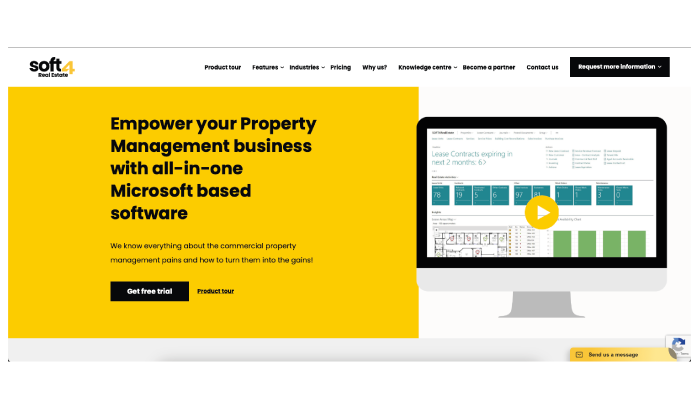
Buildium is a cloud-based property management software that caters to property managers and landlords.
It assists in rent collection, tenant screening, maintenance tracking, accounting, and lease management.
In addition, Buildium aims to simplify property management by offering features like online rent payment, document storage, and communication tools.
3. Property Boulevard
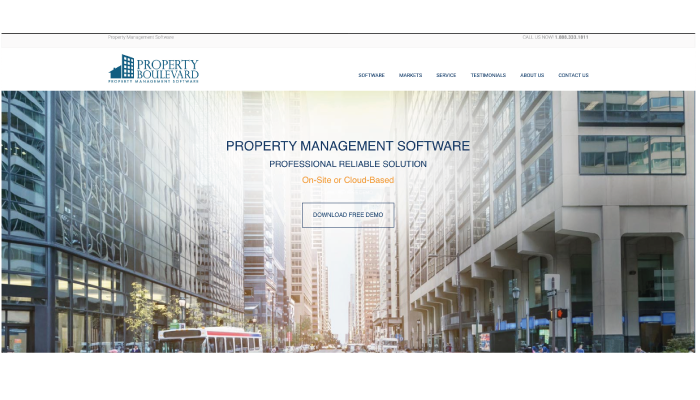
Property Boulevard is a property management solution that focuses on automating property-related tasks such as accounting, maintenance, and lease management.
It offers features for managing residential and commercial properties, including financial reporting, tenant communication, work order tracking, and more.
4. Rent Manager
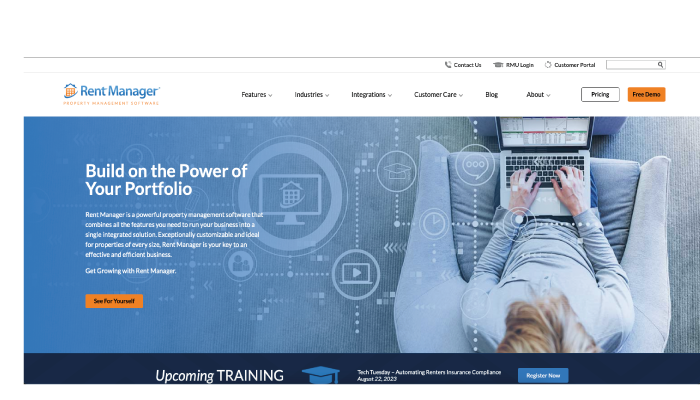
Rent Manager is a comprehensive property management software with tools for managing residential, commercial, and industrial properties.
It offers features like accounting, tenant screening, lease tracking, maintenance management, and reporting.
Moreover, Rent Manager aims to streamline property management operations and enhance tenant relationships.
5. AppFolio Property Manager
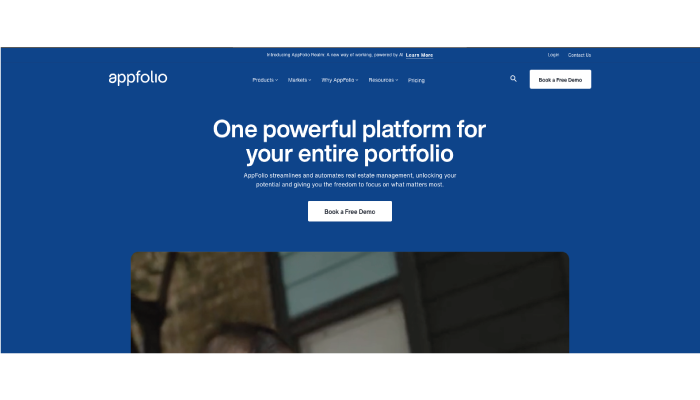
AppFolio is a cloud-based property management platform that provides solutions for residential, commercial, student housing, and homeowner association (HOA) properties.
It offers features such as online rent collection, tenant portals, maintenance requests, leasing management, and financial reporting.
6. PropertyBoss
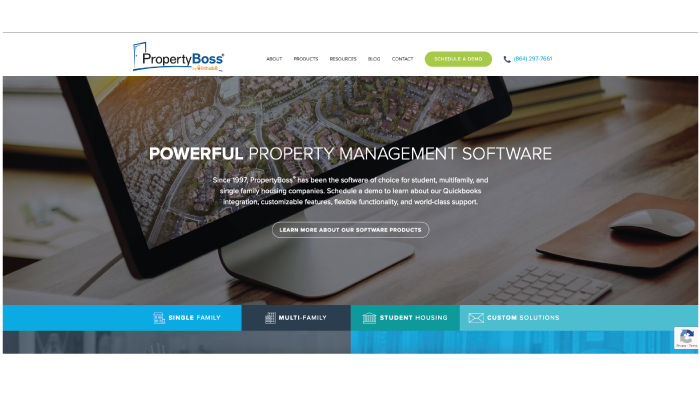
PropertyBoss is a property management software designed for residential and commercial property management.
Plus, it offers tools for lease management, tenant communication, maintenance tracking, and accounting.
PropertyBoss focuses on simplifying property management processes through automation and centralized information.
7. SKYLINE
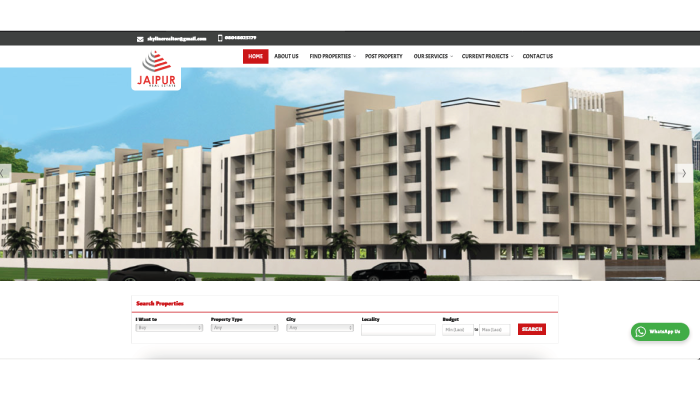
SKYLINE is a property management and accounting software tailored for commercial real estate professionals.
It offers tools for lease management, property performance analysis, financial reporting, budgeting, and more.
SKYLINE aims to support property managers, owners, and investors in optimizing their commercial property portfolios.
8. RentMaster
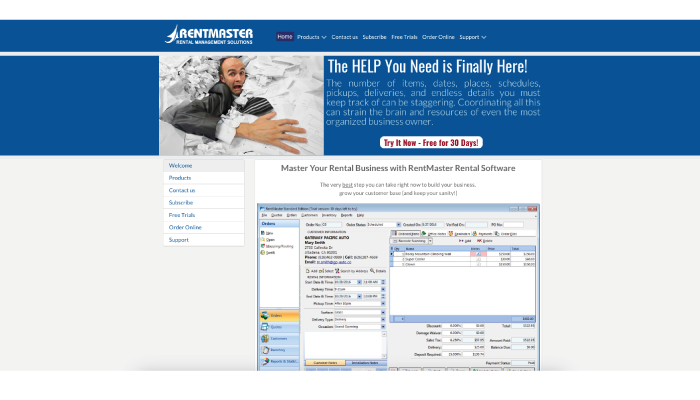
RentMaster is a property management software solution designed to assist landlords and property managers in efficiently managing their rental properties.
It provides features such as rent tracking, lease management, expense tracking, and tenant communication.
9. Easy Storage Solutions
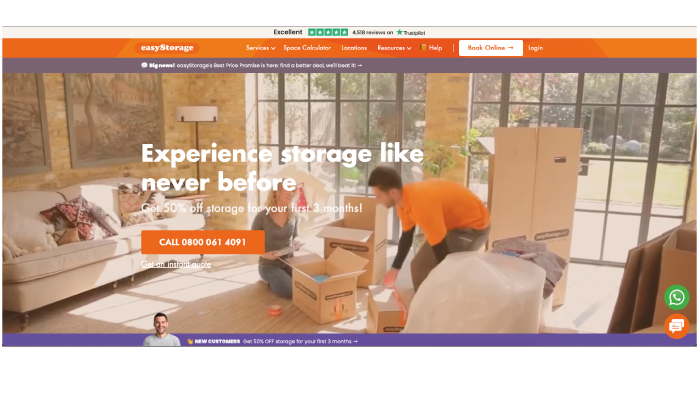
Easy Storage Solutions is property management software specifically focused on self-storage facilities.
It offers tools for managing units, tenant accounts, online payments, reservations, and facility maintenance. This software is tailored to the unique needs of self-storage property managers.
10. Rentech Direct
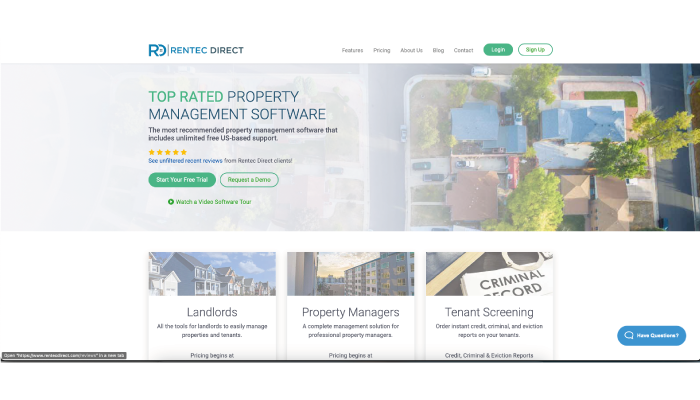
Rentech Direct offers property management software for landlords and property managers to manage residential properties.
And this property management software includes features such as tenant screening, lease management, maintenance tracking, and accounting functionalities.
11. RentPost
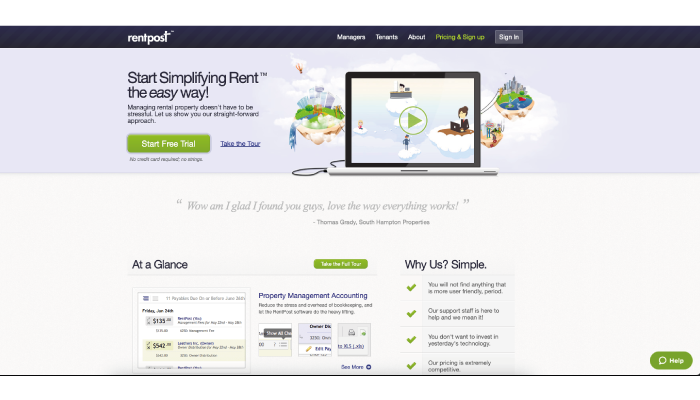
RentPost is a property management software designed for landlords and property managers.
It offers features for online rent collection, maintenance tracking, tenant communication, and financial reporting. RentPost aims to simplify property management tasks and improve tenant relations.
Ready-To-Use vs Custom Property Management Software
Just like we discussed above, there are a lot of ready to use property management softwares.
However, there are a lot of people who want to create their own custom property management software.
Therefore, let’s compare both of these and see which one to go for.
Aspect |
Ready-To-Use Software |
Custom Software |
| Development Time | Quickly available for use. | Requires significant development time. |
| Implementation Speed | Rapid implementation due to pre-built features. | Implementation time may be longer due to coding. |
| Features | Offers pre-built features and modules. | Features can be tailored to your specific needs. |
| Scalability | Limited flexibility for complex scaling. | Highly scalable as per your growth requirements. |
| Cost | Generally lower initial cost. | Higher upfront cost due to development efforts. |
| Customization | Limited customization to available options. | Highly customizable to match your unique needs. |
| Maintenance & Upgrades | Updates provided by the software provider. | Full control over updates and maintenance. |
| Integration | Limited integration with existing systems. | Seamless integration with existing systems. |
| User Training | Simpler learning curve due to standard features. | Training needed for unique, tailored features. |
| Support | General support from the software provider. | Customized support based on your requirements. |
| Long-Term Investment | Immediate solution; may need changes over time. | Long-term solution, adapts as your needs evolve. |
| Unique Business Processes | May require adjustments in workflow. | Designed to align perfectly with your processes. |
| Technical Expertise Needed | Minimal technical expertise required. | Requires skilled developers for setup and upkeep. |
| Risk of Bugs/Issues | Lower risk due to standardized software. | Potential for bugs; thorough testing is essential. |
Who Should Create Custom Property Management Software?
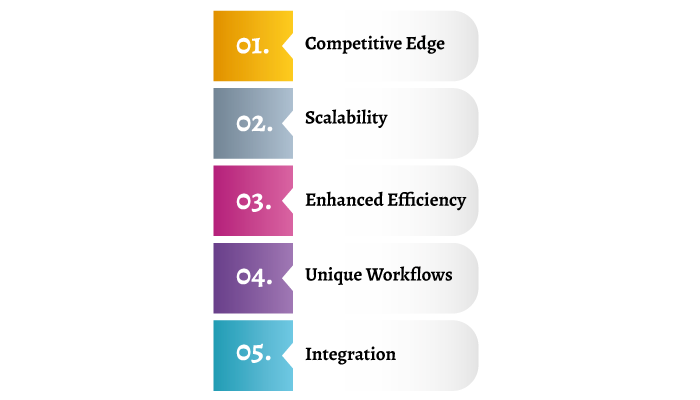
So, why should you hire dedicated developer and create your own custom property management software?
Well, there are a range of reasons to do so. Let’s look at them:
- Competitive Edge: Custom software for property management can give you a competitive advantage by providing unique features and capabilities that set you apart.
- Scalability: As your portfolio grows, custom software can be scaled to meet your evolving needs without the limitations of ready-to-use solutions.
- Enhanced Efficiency: Custom software can streamline your specific processes, increasing operational efficiency and productivity.
- Unique Workflows: If your property management needs are complex or different from existing solutions, custom software ensures your exact workflows are accommodated.
- Integration: Cloud property management software can integrate seamlessly with your existing tools and systems, avoiding the limitations of off-the-shelf solutions.
How To Create Property Management Software?
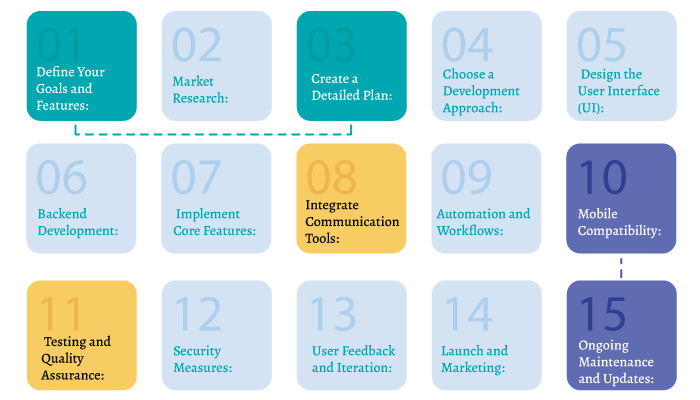
Creating property management software involves several steps that require careful planning and software development.
Here’s a step-by-step guide in the second person to help you through the process:
1. Define Your Goals and Features:
Start by outlining the goals of your property management software.
What features do you want it to have?
Consider functionalities like property listings, tenant management, rent tracking, maintenance requests, and financial reporting.
2. Market Research
Research your target audience and the existing property management software solutions.
Identify gaps in the market and understand what potential users are looking for.
3. Create a Detailed Plan
Develop a comprehensive project plan that includes timelines, resources, and milestones. This will serve as a roadmap throughout the development process.
4. Choose a Development Approach:
Decide whether you want to build the software from scratch, use a software development framework, or customize an existing property management system.
5. Design the User Interface (UI)
Create a user-friendly interface that allows property managers, landlords, and tenants to easily navigate and perform tasks. Focus on simplicity and intuitive design.
6. Backend Development
Build the backend infrastructure that will handle data storage, user authentication, property details, tenant information, and more. Use a programming language and database that suits your project’s needs
7. Implement Core Features
Start with the essential features such as property listing management, tenant profiles, lease agreements, and rent tracking.
Ensure data accuracy and security.
8. Integrate Communication Tools
Include tools for sending notifications, emails, and alerts to property managers, landlords, and tenants.
This could cover rent reminders, maintenance updates, and other important messages.
9. Automation and Workflows
Implement automated workflows for tasks like rent collection, maintenance request processing, and lease renewals. This streamlines processes and reduces manual intervention.
10. Mobile Compatibility
Consider developing a mobile app or ensuring that your software is responsive and accessible on various devices. This enhances user convenience and accessibility.
11. Testing and Quality Assurance
Rigorously test your software to identify and fix any bugs or issues. Test user scenarios, security vulnerabilities, and system performance to ensure a smooth user experience.
12. Security Measures
Implement robust security measures to protect sensitive user data, payment information, and communication channels. Encryption, secure authentication, and regular security audits are essential.
13. User Feedback and Iteration
Launch a beta version and gather feedback from users. Use this feedback to refine your software, add additional features, and improve the user experience.
14. Launch and Marketing
Once you’re confident in your software’s stability and usability, launch it to the public. Develop a marketing strategy to promote your software to property managers and landlords.
15. Ongoing Maintenance and Updates
Continuously monitor your software for issues and provide regular updates to improve performance, add features, and stay up-to-date with industry trends.
Remember, creating property management software is a complex undertaking that requires technical expertise, dedication, and attention to detail.
By following these steps, you can develop a valuable tool for property managers and landlords while providing a seamless experience for tenants.
Cost To Develop Property Management Software
The cost of developing property management software varies widely based on factors such as features, customization, development approach, and the location of the development team.
Ready-to-use software solutions can range from a few hundred dollars to a few thousand dollars per year, depending on the provider and features.
Custom solutions, tailored to your specific needs, can range from tens of thousands to several hundred thousand dollars, factoring in development, testing, and ongoing maintenance.
Therefore, if you want to learn more about it, we highly recommend that you consult a real estate app development company. They will be able to give you a deeper insight.
Conclusion
Property management software has transformed the real estate industry, providing property professionals with tools to streamline operations and enhance tenant satisfaction. Whether you’re a landlord managing a handful of properties or a property manager overseeing a diverse portfolio, property management software is a game-changer. By harnessing its capabilities, you can navigate the complexities of property management with efficiency and ease.
FAQ
Property management software simplifies administrative tasks, centralizes property information, automates processes, improves tenant communication, and provides accurate financial insights, leading to increased efficiency and better tenant relations.
Yes, property management software often includes rent tracking and collection features. It allows landlords to set up automated rent reminders, receive payments online, and keep track of rent payment history.
Yes, reputable property management software incorporates security measures such as data encryption, secure authentication, and regular security audits to protect sensitive information and ensure the privacy of users’ data.
Property management software allows tenants to submit maintenance requests digitally. Property managers can track and prioritize requests, assign tasks to maintenance teams, and provide updates on the request’s status.
Absolutely, property management software offers tools to generate financial reports, such as rent income, expenses, tax details, and more. These reports provide landlords with a clear overview of their property’s financial performance.
Most property management software systems are designed with user-friendliness in mind. Basic computer skills are sufficient, and many platforms offer tutorials or customer support to assist users in navigating the software.
Yes, many property management software solutions are mobile-responsive or offer dedicated mobile apps, enabling property managers and landlords to access and manage their properties on-the-go.
Consider your specific needs, budget, the software’s features, user reviews, and customer support. Opt for software that aligns with your goals and simplifies your property management tasks effectively.

Niketan Sharma is the CTO of Nimble AppGenie, a prominent website and mobile app development company in the USA that is delivering excellence with a commitment to boosting business growth & maximizing customer satisfaction. He is a highly motivated individual who helps SMEs and startups grow in this dynamic market with the latest technology and innovation.
Table of Contents




No Comments
Comments are closed.